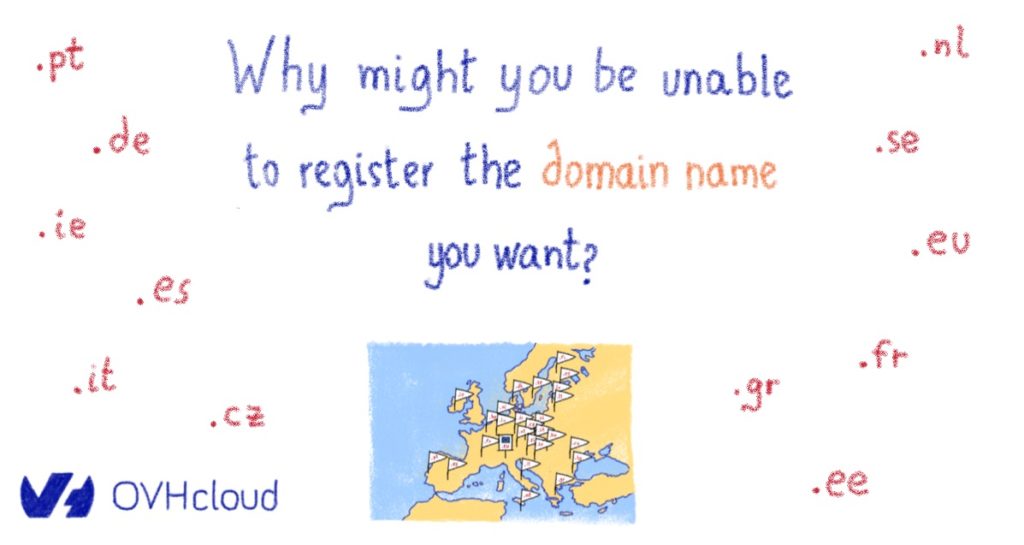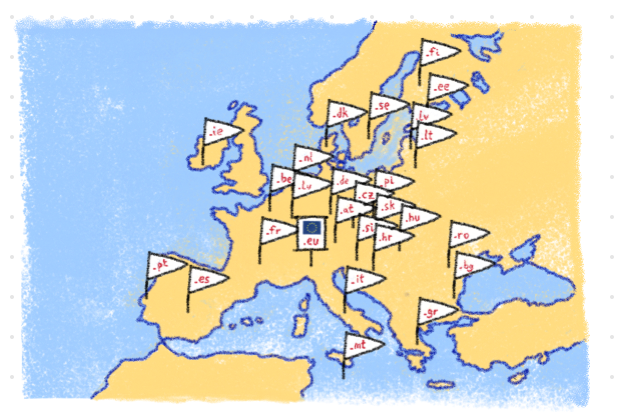In the first article of this series, we introduced you about what a domain name is. Then, in the second one, we illustrated what the lifecycle of a domain name is through the creation of pokegpu.com.

Whereas .com domain names have no restriction, this is not the case for all existing extensions. Obtaining and owning a domain name is associated with legal obligations such as:
- The effective usage of a domain name. For example, a .travel domain name must be related to the tourism industry
- Eligibility requirements. For example, the address of the contact owner of a .eu must be located within the European Union. Or, a .fr domain representing a city name requires to provide a descriptive reason of why the customer wants this domain name
These conditions are set by the extension operator, the registry, and vary according to the extensions while evolving over time.
In this article, we will explain the roles of the different contacts related to a domain name and some examples showing the scope of diversity of eligibility rules.
Contacts
A lot of eligibility conditions are related to contacts. A contact is a legal person (moral or natural) related to a domain name with a given role. It contains information about the identity of the contact, like the name, the address, the e-mail address and the phone number.
There are typically 4 types of contacts:
- Registrant: the legal owner the domain name
- Administrator: the administrator of the domain. They have the ability to do all possible actions on a domain name (DNS records change, renew, transfer out…)
- Technical: a technical contact has only the ability to change technical data on the domain name like DNS records. They don’t have any influence on the domain lifecycle though
- Billing: the account responsible of all billing related topics such as invoices and payment. By default, it is the account who created the order
By default, the technical and billing contacts are the same as the administrator.
As a customer you can configure the registrant, the administrator and the technical contacts when ordering a domain. The billing contact can be changed later in the OVHcloud Manager.
At OVHcloud, the registrant is unique to a domain name. Changing its properties is local to the domain name it’s related to. Technical and administrative contacts are global though. Changing their properties will change properties for all services using these contacts, like other domain names or web hosting you ordered.
As an individual person who wants to buy a domain to host a blog, you will often provide the same contact information for all 4 contacts. It’s the simple case.
But there are situations when all four contacts may be different. Here are some examples:
| An individual person | A company bought the domain name directly on OVHcloud | A company delegated the domain name through an OVHcloud reseller (the company is not our customer) | |
|---|---|---|---|
| Registrant | You | The company itself, with the CEO’s name | The company which is customer of the reseller |
| Administrator | You | People owning the responsibility domain name lifecycles in the company. Often the CTO. | The reseller company |
| Technical | You | Operation engineer managing production changes on the website or service using the domain name | The reseller company |
| Billing | You | The financial service of the company | The reseller company |
Data validation
As explained before, although each registry has its own rules in terms of registration, you must provide up-to-date and accurate data to the registrar when you create your domain name. This way, you must provide at least an accurate name, postal address, telephone number and email address. If you don’t comply with this requirement your registration may be cancelled by the registry. Checks on the validity of the data provided by the registrant may take place at the time of registration or during the life of the domain name. In any case, inaccurate data may lead to the suspension or even deletion of the domain name, according to the Registries’ rules. Thus, being the link between the registrant and the registries, the registrar is subject to these different rules and must ensure that the registrants respect them in this matter.

This way, as a registrar we may ask you for specific documents. As an example, the .ie which asks the registrant to upload some specific documents to finalize the registration of your .ie domain name. It may be your VAT number (in case of a legal entity) or a copy of your Irish passport (natural person). Thus, the registry requires the provision of a document from a list in order for the registrant to prove its connection with Ireland.
In this logic, a customer wishing to register a .eu needs to be a European citizen or prove that they are living in the European Union. Due to the Brexit, the conditions of registration evolved, preventing a British citizen living in the United Kingdom to register a domain name in .eu. The only exception being a British citizen residing in the European Union – they are eligible to register for a .eu domain (more info here)
Other registries and therefore extensions are concerned by these particular eligibility conditions to the registration of the domain name. We will give you a last example. Indeed, if you would like to register a .fr domain representing a city name, AFNIC requires you to provide a descriptive reason on why you want this domain and/or supporting documents. If you are the mayor of a municipality and you wish to register a domain name in the name of this municipality, for example, you will have to provide proof of your function. Following the explanations, AFNIC will authorize the registration or not.
Finally, there are some extensions for which the registry reserves the right to cancel the registration because it does not meet the eligibility requirements for registration. As an example, this is the case of .travel. This extension is open to all individuals, organizations and businesses related to travel and tourism. Thus, any participant in the travel and tourism industry can register a .travel domain name as long as it demonstrates a real link with the industry. When registering your domain name, you will only have to accept the special conditions about .travel in the very last step of your order, by validating your affiliation to this industry, before payment is made.

If you find yourself in one of the above cases, you will have to update your contact data when you register your domain name. The manage my contacts feature is accessible at step 3 of the order funnel. You will only have to click on “Manage contacts/owner” in order to modify the Owner’s information or directly create a new profile respecting the eligibility conditions of the extension. Please see below:


And last but not least, as we explained above, there are also data verification after the creation of the domain name. Indeed, we can contact a particular registrant at the specific request of the registry when there is a suspicion of inaccurate data. In addition, we also check annually the data of our customers by sending an email to validate their email address and update their data if necessary. This is the ICANN process called WDRP for Whois Data Reminder Policy. As a registrar, we reserve the right to suspend the domain if a problem is detected during these checks.
Conclusion
Customers have legal obligations and are required to respect the rules provided by the registries. Often, these rules are related to the registrant, one of the type of contacts that is associated to the domain name, but it can also be related to the usage of the domain name.
This series of 3 articles is now finished. It was an introduction to the world of domain names at OVHcloud.
We have a lot of topics to cover. In the next articles, we will talk about technical and business issues.
For example, we can talk about the EPP standard, the most used communication protocol between registrars and registries. And how we test our system when some registries do not provide testing platforms.
We can also talk about the interest of brand protection and the interest of having a domain name for a company (even for offline activities).
See you next time


